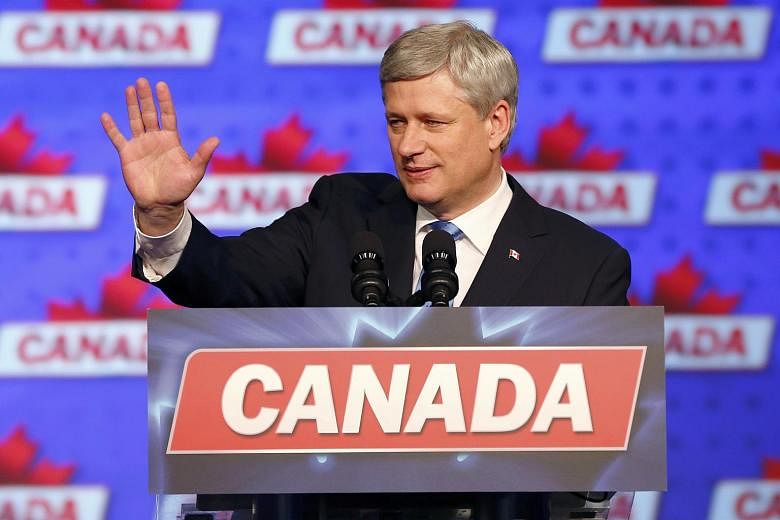CALGARY/OTTAWA (REUTERS) - When outgoing Canadian Prime Minister Stephen Harper launched the longest Canadian election campaign in more than a century in August, he announced "this isn't a popularity contest."
Unfortunately for Harper, who lost Monday's (Oct 19) election to the opposition Liberals, it was just that. The 78-day marathon allowed voters to decide they no longer liked the ruling Conservatives and ditched them after almost a decade in power.
An emailed statement from the Conservatives said Harper resigned as party leader after the defeat, though he did not mention stepping down in his concession speech.
"It's a bad night for the Conservative party, but we'll come back. I think where we went wrong was on tone," said outgoing Defence Minister Jason Kenney, long touted as a potential replacement for Harper. "As for leadership speculation, that's all for another day."
Insiders said the party ran an unimaginative low-energy campaign that failed to recognise how fed up people were with Harper. They also badly underestimated Liberal leader Justin Trudeau.
The 56-year-old economist was a divisive figure who dominated his government, a man adored by those who liked what they saw as his principled, uncompromising style and detested by opponents who decried his dictatorial style.
He ran on a platform of tax cuts, stressing his record on the economy as well as the need to boost security. He also made sure he was the only public face of the campaign.
"It's hard to run on your record and promise change at the same time," said one veteran legislator. "If you propose new initiatives, people will ask 'Why didn't you do that earlier?'"
The Conservative effort was hurt when three key Harper lieutenants, including the foreign minister, unexpectedly quit in the run-up to the elections, depriving the party of vital expertise.
Despite the defections, the Conservative war room was confident the party could benefit from Trudeau's supposed weaknesses, running ads saying he was "just not ready."
Ahead of the first televised debate, campaign spokesman Kory Teneycke said that if Trudeau "comes on stage with his pants on, he will probably exceed expectations."
Trudeau ended up performing well in the debate. "(Teneycke's) remarks were stupid," said one war room operative. "He'd love to take them back if he could."
The longer the campaign ran, the more voters saw Harper on television every day. Conservatives knocking on doors started to hear increasingly vociferous complaints about the prime minister, even from long-term supporters.
"He has made the government all about him ... and right to the bitter end the election was a referendum on him. That was a flawed strategy," said a former senior Conservative who has worked with Harper.
The Conservatives abruptly began running ads with the message that while "Harper's not perfect", he remained the best man to run the economy.
The sudden confession that a man who never admitted to making mistakes was flawed only underlined the unfocused nature of the campaign.
Harper was accused of inciting Islamophobia with the government's attempt to ban Muslim women to remove their face veils in citizenship ceremonies.
The policy proved very popular in the province of Quebec, the main power base for the New Democrats, who alienated their own supporters by saying Harper was wrong.
As the NDP slumped, it meant an end to vote-splitting as NDP voters migrated to the Liberals.
"It's very clear tonight what happened, the NDP vote collapsed and handed the Liberals a majority," said Guy Giorno, Conservative campaign chair at a somber Conservative gathering in Calgary. "The other thing is we were seeking to help Mr. Harper do something historic - nobody in more than 100 years has won four in a row. We knew it was a monumental challenge and we just couldn't buck history."
Harper changed tactics again, appearing at events with a giant noisy cash register and supporters peeling off wads of money to show how much they would lose under the Liberals. He also appeared in a new television ad, telling voters the election "is not about me."
And on the final weekend, Harper attended a rally in Toronto hosted by controversial former Mayor Rob Ford, who hit the headlines in 2013 for admitting he had smoked crack cocaine while in office.
Harper made sure not to shake Ford's hand during the event, but the ex-mayor later tweeted a picture of himself with a smiling prime minister. The photo was then splashed across the front page of the Toronto Star, Canada's largest circulation newspaper.
"It turned a lot of Conservatives into potential Liberal voters because they said 'It's just morally bankrupt to be standing with that guy,'" said Ipsos pollster John Wright.

